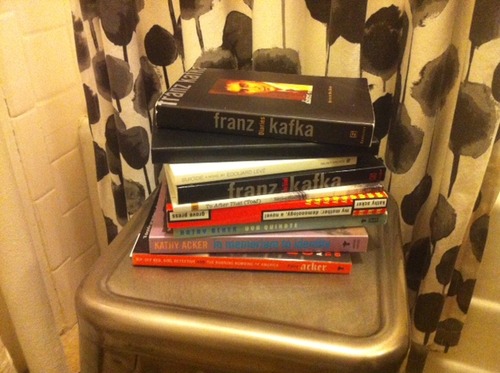
Sheila Heti: Okay, let’s talk about what we have here. Four Kathy Acker books. Suicide by Edouard Levé. To After That—who’s the author? Two Kafka books, and a black book that looks like a journal.
Kate Zambreno: Oh, To After That is one of my favorite contemporary novels, by Renee Gladman, that I’m teaching this semester at Sarah Lawrence. A slim novel in which the writer meditates on the failure of a past unpublished book. I love that book—keep returning to it. I love how subtle and meditative it is.
SH: Do you keep it in the bathroom because you like to open it up randomly and just enjoy the sentences, or why is it there?
KZ: I only keep books in the bathroom when I’m in the bathtub. Our bathroom is really humid and everything gets wet really easily. So those were just the books that I was dragging in to look at that day (probably a couple weeks ago?). Have been thinking a lot about Kafka lately, so was looking at his journals. Thinking about Kafka’s feelings about being a writer. The Levé Suicide I had finished that day—read it all in one day and found it such an enormous and sly feat, this second-person meditation on a past friend who killed himself, and then the extra text of that book, how Levé then killed himself a few days afterwards. So with that book I was looking at it longingly and just picking it up and thinking, how did he do it? how did he produce something so sly and marvelous and also strangely joyful? Acker is for an essay I’m late on writing, for an anthology on her works, so I drag them everywhere in the hopes that I’ll start working on the essay.
SH: So how long would you say that pile remained like that for? Just the day?
KZ: That pile remained like that for a day, yeah, until the next time one of us needed to shower. I keep the books on a stool that I drag in from the other room.
SH: You say you’ve been thinking about Kafka a lot lately. What have you been thinking about him?
KZ: I’ve been thinking of ideas of disappearance and ego in the figure of the writer historically. How Kafka was obviously a genius writer who steadily worked on his journals, stories and novels, producing them somewhat through autobiography, but also how he wanted to destroy his writing or not publish it. I’m also interested in Kafka as a writer who in some ways used the self and his experiences in his novels, but channeled it through this relentlessly dystopic vision.
SH: It’s curious because the only book in Tao Lin’s bathroom when I interviewed him for this series was a Kafka biography. So my second question is: is there something about Kafka and bathrooms?
KZ: Tao Lin was reading Kafka. That’s funny, I was just reading Tao Lin, as I’m teaching his Taipei. I think Kafka’s journals are actually great for the bathroom—they’re very bodily. Sometimes they’re about his exercise or diet, but also these scathing vignettes or aphorisms about writing. I could say something clever maybe about Kafka and the excremental but I really don’t know what.
SH: This brings us to Acker, of course. Apart from the fact that you’re writing about her, is the body-ness in her work made better in the context of a bathroom?
KZ: That’s funny, because in an early early draft of Heroines, I wrote about rereading Blood and Guts in High School while having the worst attack of explosive diarrhea while driving from Chicago back to Akron, Ohio, and kind of mirroring that with my uncle who was dying of liver cancer and just in agony, and looking at my illness as some sort of bizarre sympathetic reaction. Chris [Kraus], my editor, was like, this is all really gross. So I took it out. But I keep on thinking about how Kathy writes illness, and writes pelvic inflammatory disease, into the books, how she is writing the viscera of what we’re not supposed to talk about—the explosive and messy body that’s supposed to be quiet and behaved.
SH: Wow. Do you ever write in the bathroom?
KZ: I have written in the bathtub. I can pull a Margot Tenenbaum for hours. But the problem is my notebook gets wet. I’ve written notes on my cell phone in the bathroom, I’ve started to do that more, email myself notes, this endless chain, or I recently had a rather intense epistolary with someone this summer, and I would write the person on my cellphone in the bathroom. If I’m really thinking of something, I’ll take notes in the bathroom. I usually try to leave notebooks around the house, but not in the bathroom because everything would just get kind of damp. “Bathroom” is so funny, it’s so proper.
SH: Really? Maybe it’s cause I’m Canadian. Do you say washroom?
KZ: No, Americans say bathroom too. I say “toilet” but that makes it sound like I think I’m British. Maybe I’m uneasy of how my Chicago accent comes out when I say “bathroom.”
SH: Toilet sounds dirtier to me.
KZ: Well right, “bathroom” is so clean-sounding, but really we’re talking about the place you shit in. Perhaps I like more of the grotesqueness of “toilet.” It’s more to the point. I bet Kathy Acker said toilet.




